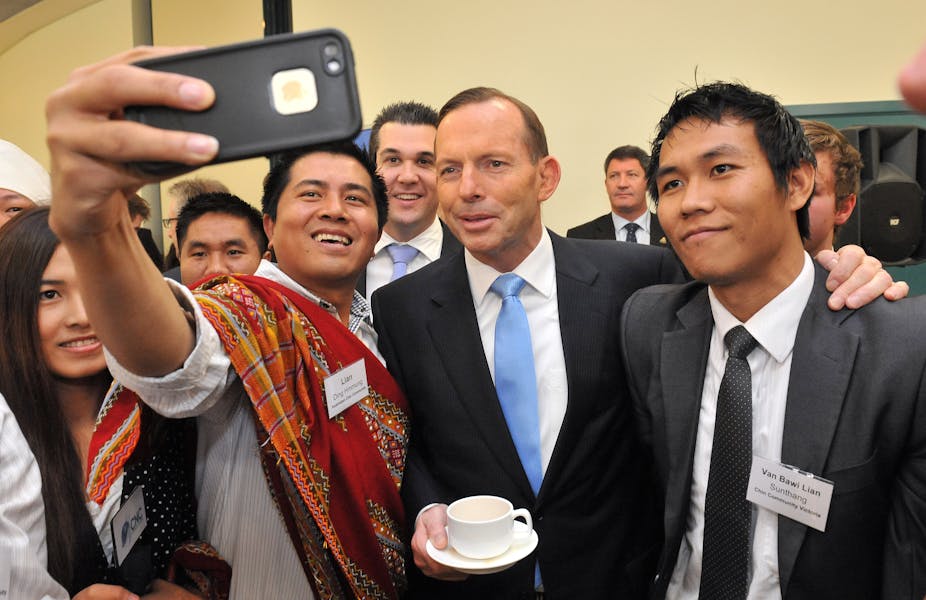Australia’s prime minister Tony Abbott is uncommonly fond of sport metaphors, not least when addressing the domestic terror threat. His latest championing of “Team Australia” in trying to sell his government’s proposed national security reforms symbolically turns Australia into a giant dressing room and stadium.
Presiding over the nation as team captain, Abbott assumes the mantle of unassailable Bradmanesque hero rather than a Shakespearean “scurvy politician”.
Abbott recently told the South Australian Liberal Party’s annual general meeting about a Muslim community leader who:
… said to me on Tuesday in Melbourne, in a booming voice full of exuberance, he said: ‘You know we are all part of team Australia’ – and he looked at me and smiled – ‘and you are our captain.’ I have never been more proud and I have never been more exhilarated than to hear that statement.
Captured smilingly receiving applause in the television lights, Abbott resembles nobody more than (the recently deceased) Robin Williams playing school teacher John Keating in the famous “O Captain! My Captain!” scene from the 1989 film Dead Poets Society.
Beloved by Abbott’s ideological fellow traveller Alan Jones – a former teacher and sports coach and now prominent radio broadcaster – Dead Poets Society’s stirring tale of a maverick teacher in an elite private all-male school chimes well both with their biographies and mutual idealisation of the beloved “captain”.
It is a view of the world shared by another prominent conservative, former prime minister John Howard, who once ruefully observed to another right-wing radio man, the late Stan Zemanek, that the most important job in the country was really that of Australian men’s cricket captain.
Not all teams are of a sporting nature. But there is little doubt that Abbott the pugilist, rugby player and ironman has sport in mind when he describes Australia as a team.
This is a familiar populist gambit. Nations are hard to capture, and sporting teams routinely represent them under the flag when pitted against other nations. As the late historian Eric Hobsbawm wrote:
What has made sport so uniquely effective a medium for inculcating national feelings, at all events for males, is the ease with which even the least political or public individuals can identify with the nation as symbolised by young persons excelling at what practically every man wants, or at one time in his life has wanted, to be good at. The imagined community of millions seems more real as a team of 11 named people.
Hobsbawm had an association football team in mind. However, this specific mix of inherited Britishness and masculinity simultaneously sits comfortably with Abbott. It also explains why those who are not the sons of migrant English dentists might feel uneasy about Team Australia’s formation, tactics and philosophy.
Team talk is especially potent in times of war. George Orwell’s pithy summation of sport as “war minus the shooting” is often wheeled out in debates about the routine connection between militarism and physical games. The transparent intention of evoking Team Australia is to encourage the kind of collective purpose and identity evident when the Australian cricket or Olympic teams are “doing battle” as if – as is the case with war – their very lives depended on it.

But to imagine a sporting team as a country is to confuse a condensed, crafted representation with the nation itself. This is a standard rhetorical move in sport commentary but it is misleading for a number of reasons.
Nations are diverse, sprawling entities comprised of citizens with widely different experiences, motivations and values. Sport team participants, by contrast, have a very limited common purpose, obeying artificially imposed rules for fun, fitness and profit. Citizens elect their captains as their representatives, while sporting teams and their captains are selected by powerful individuals or committees.
Except at school (more shades of Dead Poets Society here), participation and spectatorship in sport are voluntary activities. Few people – including migrants and, especially, refugees – can easily opt in or out of citizenship.
In other words, Team Australia is mainly fantasy. Like all fantasies it may have its uses, but it is also vulnerable to over-reach and abuse.
When he was elected after several years of attritional political conflict that plainly left many in the electorate disillusioned with the political process, Abbott represented sport as a blessed relief from politics. He declared on breakfast television that:
Happy is the country which is more interested in sport than in politics.
Less than a year later, in seeking more state power over the citizenry, Abbott is happy to deploy the language of sport for political ends. But the proud captain should beware of hubris.
Notwithstanding the support of many of his pupils, Dead Poets Society’s “captain” John Keating was still sacked. More poignantly, Keating’s rallying poem “O Captain! My Captain!” was Walt Whitman’s elegy for Abraham Lincoln. Despite the poem’s imprecation, “O Captain! my Captain! rise up and hear the bells; Rise up – for you the flag is flung – for you the bugle trills”, it did not end well for Team America.

